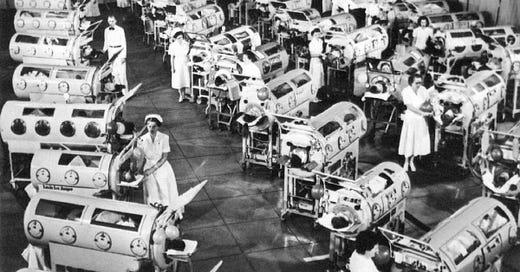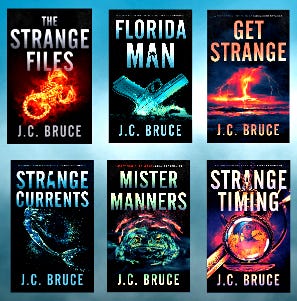Before the Polio Vaccine, Scenes Like This Were Common. We Don't Need a Replay
We must prevent a return to the bad old days of crippled children and iron lungs.
My friend Terry Jackson contracted polio when he was a small child. While he didn’t end up spending his life in an iron lung like thousands of other kids, the disease left him deformed, and he spent his years on crutches.
As horrible as that was, it could have been worse.
In the mid-20th century, up to 20,000 people — mostly children — were paralyzed by the polio virus every year in America. Worldwide, more than half a million people were either killed or left immobile annually.
The paralysis made it impossible for many to breathe on their own and they had to be placed in so-called iron lungs, as in the photo at the top of this article, often ending their lives trapped in those artificial breathing machines.
Then in the 1950s a vaccine using inactivated polio viruses was developed by American virologist and medical researcher Jonas Salk, who, by the way, rather than making a killing on his discovery, stopped the killing by giving it away for free.
Oh, and to show how safe it was, he administered it not only to himself but also his family.
The drop in polio cases in the U.S. was dramatic after the mass immunizations Salk launched. By the numbers:
1952 — 20,000 paralytic cases of polio.
1957 — 5,600 cases.
1960 — 2,525 cases.
1965 — 61 cases.
2020 — Zero cases.
With such stunning evidence of success, it seems crazy that anyone would argue that the vaccine should no longer receive approval from the Food and Drug Administration, but that’s exactly what one of Robert F. Kennedy Jr.’s close advisors has urged.
Kennedy, of course, is President Elect Donald Trump’s nominee to head the sprawling Health and Human Services operation. As such, he would have authority over the Food and Drug Administration which oversees vaccines.
Kennedy is an infamous vaccine skeptic. Being doubtful of vaccines is about as scientific as questioning the existence of gravity. But why pay attention to numbers, such as those cited above, when there are so many fascinating conspiracy theories to keep one’s mind entertained?
Let’s clear up one point: Some critics of the polio vaccine argue that deaths from the disease were already in decline before Salk’s discovery. Which is true.
Why?
There are several reasons, not the least among which were those life-saving iron lungs and advancement in polio treatment.
But worldwide improvements in sanitation were also a big factor. Perhaps the single most important thing we do to protect ourselves from disease is our management of human and animal wastes, which are breeding grounds for disease.
Here’s what the Centers for Disease Control says about just one way we protect ourselves from poor sanitation:
“Proper sanitation facilities (such as toilets) promote health by allowing people to dispose of their waste appropriately … Without proper sanitation, waste from infected individuals may contaminate a community’s land and water, increasing others’ risk of infection.”
Think Black Plague. Or think polio in the early part of the 20th century. Even though it may have been on the decline compared to even more horrendous years, there’s still that number: 20,000 paralyzed people, mostly children, every year in the United States.
One currently surviving polio victim had this to say about proposals to revoke the authorization for life-saving vaccines:
“Efforts to undermine public confidence in proven cures are not just uninformed — they’re dangerous. Anyone seeking the Senate’s consent to serve in the incoming Administration would do well to steer clear of even the appearance of association with such efforts.”
That was Senate Republican leader Mitch McConnell.
His fellow Senators must not allow anyone to oversee our health who doubts the effectiveness of life-saving vaccines. We don’t need anti-science crackpots at the helm of our public health institutions.
My friend Terry was born a few years too soon. The polio vaccine was still being tested when he came down with the disease. He had just celebrated his first birthday.
Terry defied all the expectations of his doctors. His parents were warned he’d never see adulthood after spending so much of his childhood in a full-body cast. But he hung in there until his early 50s. He was an amazing guy. I wish he were still with us now. I’m sure he’d have a few choice words about all this.
While tens of thousands of other polio victims never made it as far as Terry, countless more—including many of you reading this—might not be alive today were it not for the vaccine.
To put it bluntly, Senators, there won’t be a room hot enough in Hell for any of you who allow polio back into our midst.
J.C. Bruce is an award-winning journalist and author of The Strange Files series of mysterious novels (available on Amazon, Barnes & Noble, Kobo, other online booksellers, and at selected libraries). His latest novel, Strange Timing, has been named Florida Book of the Year.








